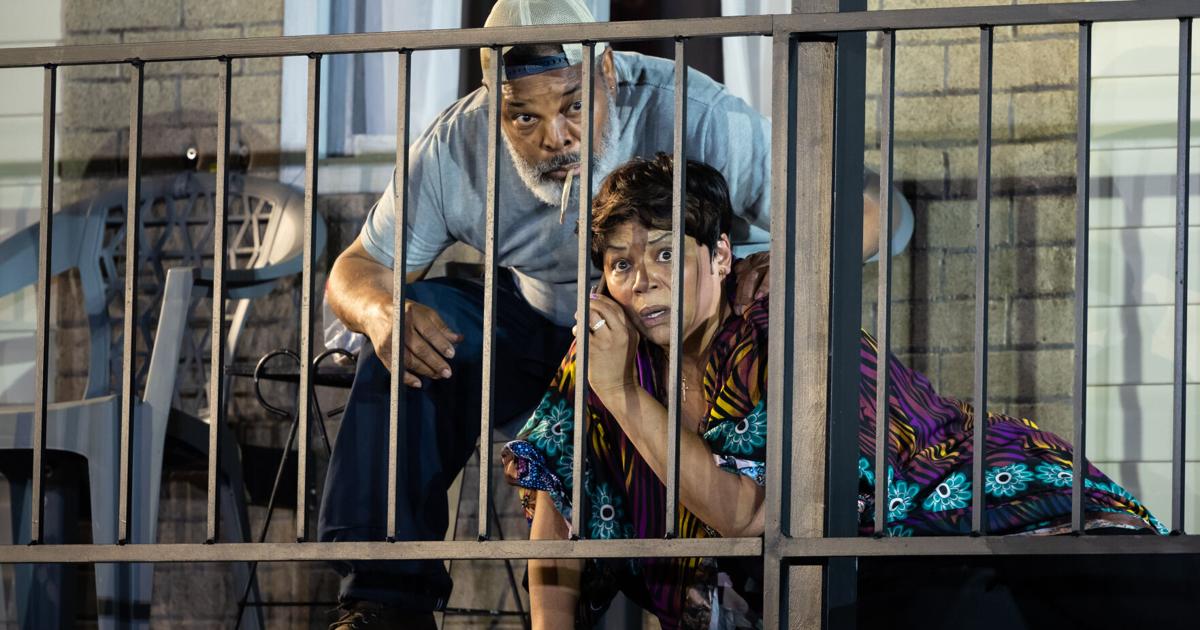Zora Howard subtitles “Bust,” which is having its world premiere at Goodman Theatre in a co-production with Atlanta’s Alliance Theatre (where it played first), “An Afrocurrentist Play.” But that subtitle doesn’t prepare you for the ultra-broad comedy and science fiction surrealism she combines to explore a very serious subject and a deeply pessimistic view of race relations.
As Howard writes in the program notes: “At its core, ‘Bust’ is a meditation on rage … It asks, ‘What if Black people could use the rage that we carry, with which we are in such constant and intimate relationship, for our own constructive and collective gain?’ It is an offering—an invitation for all of us to consider how we might harness our rage, what we can move with it.” The play also asks if any place is safe for the oppressed and examines the costs of finding a refuge from the rage.
Set in Huntsville, Alabama, the action begins on an ordinary evening with ebullient Retta (Caroline Stefanie Clay) sitting on the balcony overlooking the parking lot of her housing complex, gossiping on the phone with her friend Tony about people they both know. She’s soon joined by her hen-pecked husband, Reggie (Ray Anthony Thomas), and they drink beer, smoke a joint, flirt and continue the phone conversation while waiting for their grandson, Trent (Cecil Blutcher), to come home from basketball practice.
Then Retta sees their neighbor, Mr. Woods (Keith Randolph Smith), pull into the parking lot in his old Buick—trailed by a police car. She goes into the full blow-by-blow description for Tony (and us) as the cops ask Mr. Woods to get out of the car and the situation escalates. As Retta and Reggie crouch down on the balcony to avoid being seen, Trent arrives and, seeing the harassment below, begins recording it on his cell phone.
Just as the cops are poised to shoot Mr. Woods, the unimaginable happens, setting the rest of the plot in motion. I don’t want to ruin the surprise by divulging it, but it involves Mr. Woods’ mode of escape, a similar crisis Trent faces and how their meeting—“elsewhere”—influences the younger man’s choices, culminating in a profoundly ironic climax.
Trent’s clash with the powers that be happens in his high school history classroom. On the one hand, he’s goaded into posting online the incident he recorded by his classmates Boobie, Zeke and Paige (Ivan Cecil Walks, Bernard Gilbert and Victoria Omoregie, respectively), which leads to the cops tracking him down. On the other, he’s assaulted and beaten by a white security guard, Jack, for coming to the defense of his fellow student and crush, Krystal (Renika Williams-Blutcher). Krystal was forcibly removed by that guard for refusing to obey the white teacher Ms. Pinto’s (Caitlin Hargraves) demand that she forfeit taking a test because she was a few minutes late to class.
Even more racist than Ms. Pinto or Jack is the white cop Tomlin (Mark Bedard, who also plays Jack), a bully with a hair-trigger temper and anger management issues who has been demoted because of them. His partner, Ramirez (Jorge Luna), is a by-the-rules transfer from another department, so they often fight and not just because Tomlin insists on calling Ramirez a rookie and Mexican, even though he’s Honduran.
Director Lileana Blain-Cruz leans into the humor, so some scenes come across as sitcom-on-steroids, and virtually all the characters are stereotypes. The exception is Blutcher’s troubled Trent in his encounters with Mr. Woods, which suggests that the play would work better if it aimed for more veracity within the context of the far-out premise rather than relying on laughs. I’d also like to see the relationship between Trent and super-smart Krystal develop more.
Matt Saunders’ set design is both intriguing and distracting. It features boxes representing Retta and Reggie’s apartment, the police station and the classroom that glide on and off stage, as well as swirls and whirls of super-saturated color by lighting designer Yi Zhao and special effects designer Jeremy Chernick that represent “elsewhere.” Dominique Fawn Hill designed the apropos costumes. There’s also a complicated soundscape thanks to designer Mikaal Sulaiman, composer Julian Davis Reid and sonic dramaturg DJ Reborn. On opening night, some of the effects didn’t seem to work quite the way they should.
